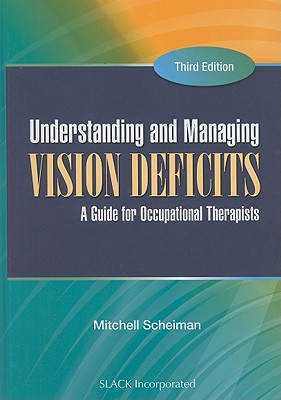
Scheiman, Mitchell
product information
description
2
The Third Edition of Understanding and Managing Vision Deficits is the go-to resource that will enable occupational therapists to develop a comprehensive understanding of vision, appreciate the various effects vision problems can have on the practice of occupational therapy, and to more effectively manage patients with vision disorders.
Understanding and Managing Vision Deficits: A Guide for Occupational Therapists, Third Editionis a unique collaboration from occupational therapists, optometrists, and low vision rehabilitation specialists. Dr. Mitchell Scheiman presents a unique Three Component Model of Vision that includes:- Visual integrity: Includes visual acuity (clarity), the optics of the eye, and eye health
- Visual efficiency skills: Includes focusing, eye teaming, and eye movements
- Visual information processing skills: Includes the ability to analyze, interpret and respond to visual information
- Visual problems associated with learning disorders
- Visual problems associated with acquired brain injury
- Management of vision problems for children with special needs
- Low vision
- Updated figures, research, and references
- Incorporates current American Occupational Therapy Association Practice Framework
- Glossary of key terms
- Appendices that include a vision screening report form and low vision supplies and equipment
member goods
No member items were found under this heading.
Return Policy
All sales are final
Shipping
No special shipping considerations available.
Shipping fees determined at checkout.







